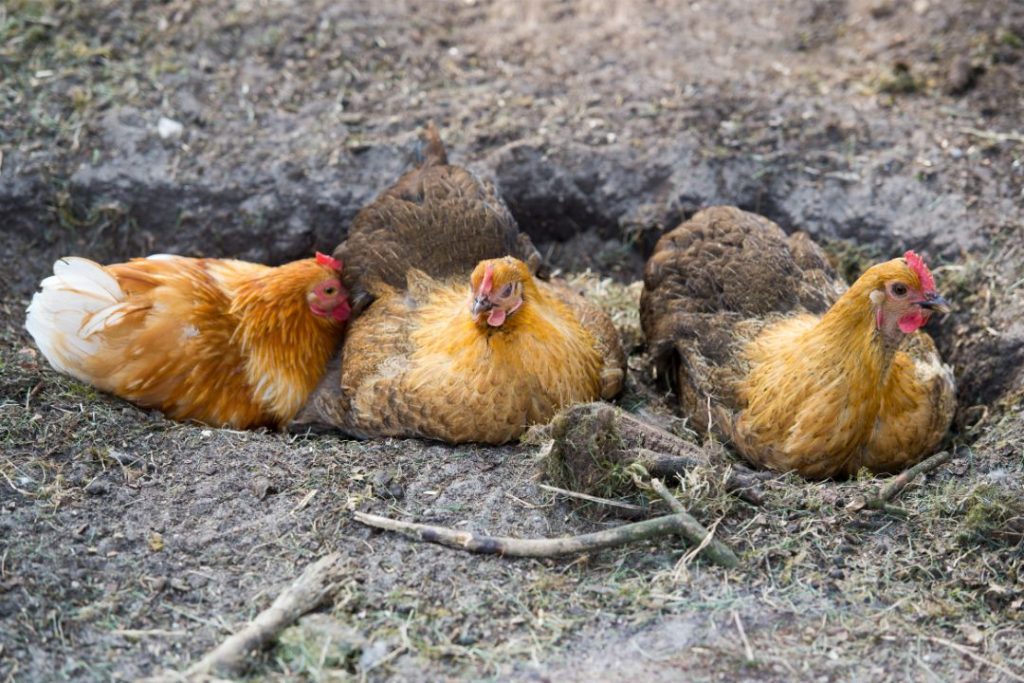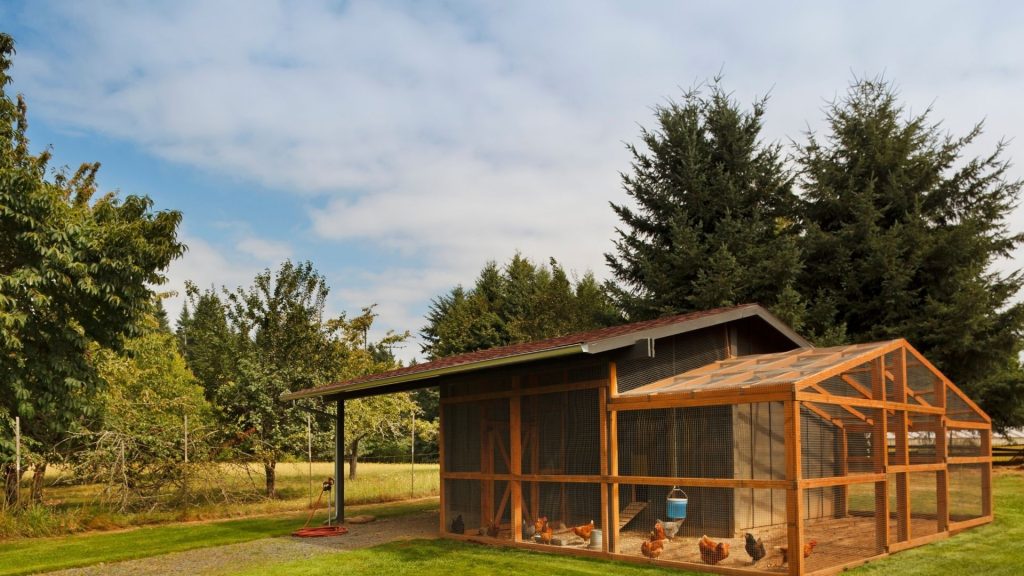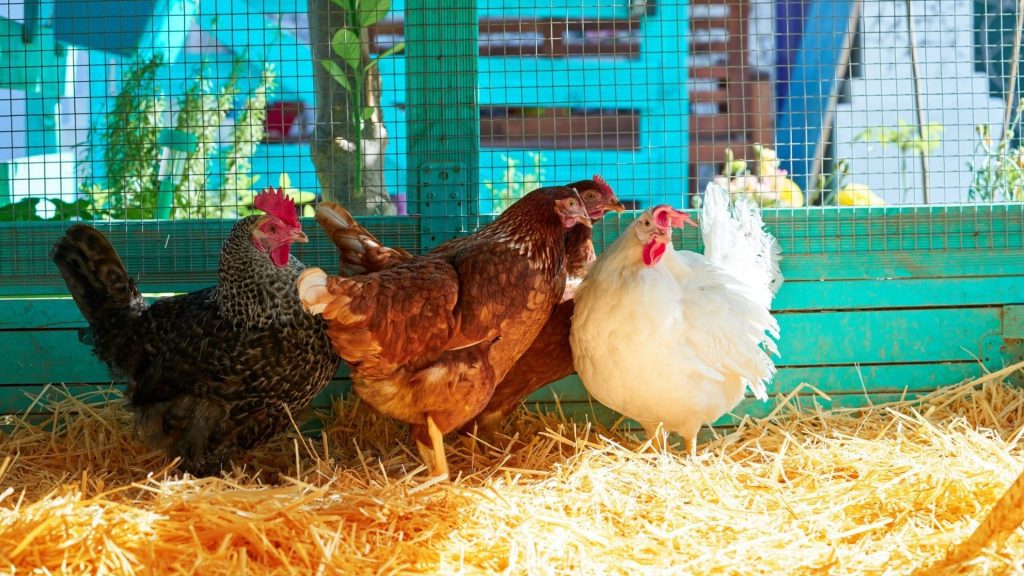Can chickens be out in the rain?” is a common query many chicken owners and enthusiasts have. Rain is a natural occurrence, and while we humans have the luxury of staying indoors, what about our backyard chickens? Do they enjoy the rain, or does it pose potential risks to their health?
Understanding how rain affects chickens is crucial for anyone who cares for or is interested in raising them. Today’s guide will discuss the relationship between chickens and rain. We will also shed light on their behaviors, needs, and the precautions one should consider during wet weather.
What Is Chicken Behavior in Rain?
Some chickens might revel in the wetness during rain, flapping their wings and enjoying the cool droplets. These are the ones who see rain as a playmate, reminding them of the wild, wet jungles their ancestors called home.
On the other hand, some chickens might view rain as a dampener, quite literally. For them, comfort lies in staying dry. These birds will often be seen hurrying to their coop, seeking refuge from the relentless drops.
The soft, wet earth becomes a treasure trove of edible delights. As chickens scratch the ground, they uncover worms, insects, and other critters that usually stay hidden. This natural bounty is rich in protein, making it a nutritious treat for the flock.
1. Natural Instincts
Chickens, descendants of the wild jungle fowl, have instincts that guide their behaviour. In their natural habitat, rain is frequent. Some chickens might relish the rain, using it as a natural shower, while others might prefer the warmth of their coop. Observing your flock can provide valuable insights into their individual rain preferences.
Hailing from the lineage of wild jungle fowl, chickens carry inherent behaviors. Rain was a daily affair in the dense forests where their ancestors roamed. While some chickens find solace in raindrops, considering them as nature’s spa, others might shy away, yearning for their coop’s dry embrace.
A keen eye on your flock during rain reveals fascinating patterns, highlighting each bird’s unique relationship with rain.
2. Feeding Habits
Rain can be a blessing for chickens in terms of food. What do chickens do when it rains? They forage! Rain brings out a buffet of worms, insects, and other critters. This is a feast that most chickens can’t resist, making post-rain foraging sessions a common sight.
Rain showers often signal a feast for chickens. Curious about their antics during a downpour? They’re on a food hunt. The rain’s magic draws worms, insects, and tiny creatures to the surface. For chickens, this is akin to a buffet spread out just for them.
The aftermath of a rainstorm typically sees a bustling poultry yard, with chickens eagerly pecking at the ground, savoring every bite.
Common Myths About Chickens and Rain
The common myths about chickens and rain are:
Can Chickens Drown in the Rain?
Many myths surround chickens, and one of the most puzzling is their relationship with rain. A prevalent misconception is that chickens can drown when it rains. Let’s debunk this myth.
A heavy downpour might drench them. But the idea of them drowning in the rain is far from the truth. Chickens have an instinct to protect themselves from rain. Chickens typically seek shelter in too much rain.
However, rain won’t cause chickens to drown. Stagnant water in their surroundings can be dangerous. Puddles or small ponds that form after heavy rains can pose a threat, especially to younger or smaller birds.
Chickens are curious creatures. They might wade into these water bodies, and if they’re too deep, there’s a risk of drowning. Ensuring proper drainage in and around their living spaces is crucial. A well-drained area keeps chickens safe and prevents other issues like mud and potential bacterial growth.
Will Chickens Get Out of the Rain?
Another intriguing question many poultry enthusiasts ponder is whether chickens seek shelter during rain. There’s a common belief that chickens remain indifferent to getting wet. But is this true?
Observing a flock during different rain intensities can be quite enlightening. During a light drizzle, chickens might be going about their usual activities. Rain can bring out worms and other insects from the ground, turning the wet environment into a feasting ground for them. So, a light drizzle might not deter them from their quest for food.
However, the scenario changes when the skies open up with a heavy downpour. No one, including chickens, enjoys getting drenched in torrential rain. Chickens are no exception. When raindrops become too heavy and persistent, chickens instinctively look for shelter. This could be under a tree, a shed, or their coop. Their primary aim is to find a dry spot where they can wait out the storm.
What Are the Science Behind Chickens and Rain?
The relationship between chickens and rain blends nature’s design and the bird’s inherent behaviors. While their feathers are marvelously designed to repel water and provide insulation, there are limits to what they can endure.
As stewards of these fascinating creatures, understanding the science behind their interaction with rain equips us to provide better care, ensuring their health and happiness.
1. Feather Functionality
Chickens, with their vibrant and varied plumage, often captivate our attention. But beyond their aesthetic appeal, these feathers serve a vital purpose, especially regarding rain. Each feather, intricately designed, plays a role in protecting the chicken from external elements.
One of the marvels of chicken feathers is their water-repelling ability. Nature has equipped them with a special oil that coats their outer feathers. This oil, produced by a gland located near their tail, acts as a natural waterproofing agent.
When raindrops fall on them, they bead up and roll off instead of soaking the bird. This mechanism ensures that the chicken doesn’t get drenched easily. But why is this oil so crucial?
Imagine wearing a coat in the rain that absorbs water instead of repelling it. Not only would it become heavy, but it would also fail to protect you from the cold. Similarly, a chicken’s feathers would lose their protective capabilities without this oil.
2. Body Temperature Regulation
Beyond the beauty and water resistance, feathers play another critical role: insulation. Just as we wear layers to keep warm, chickens rely on their feathers to trap air, creating an insulating layer against the cold.
But what happens when these feathers get wet? Chicken’s feather structure are designed to trap air. Wet feathers clump together, losing their fluffiness. This means the insulating layer of trapped air disappears, making it harder for chickens to maintain their body temperature.
Let’s address a pressing concern: Can rain make chickens sick? The answer leans towards yes, especially if the exposure is prolonged and the weather is cold. A wet chicken struggles to warm itself. Over time, this can lead to hypothermia. Symptoms might include lethargy, pale comb and wattles, and a refusal to eat. If not addressed, this can be fatal.
So, while a brief stint in the rain might not harm them, prolonged exposure poses a risk, especially in colder climates. Poultry keepers need to be aware of this and ensure that their flock has access to dry and warm shelter, especially during inclement weather.
What Are the Potential Risks for Chickens in Rain?
Rain is a natural phenomenon. But for chickens, it brings a set of challenges. From battling the cold to navigating muddy terrains and ensuring their coop remains safe, chickens rely on their keepers for protection.
Understanding these potential risks empowers poultry enthusiasts to take protective measures to ensure the well-being of their flock. With the right precautions, chickens can weather any storm and thrive.
1. Hypothermia
While refreshing for many creatures, rain poses a significant risk to chickens: hypothermia. On cold, rainy days, chickens face the challenge of maintaining their body temperature. Their primary defence against the cold is their feathers, which trap air, creating a warm insulating layer.
But when these feathers become wet, their efficiency drops dramatically. The once fluffy and air-trapping feathers stick together, losing their insulating properties.
As a result, chickens find it hard to retain body heat. Signs of hypothermia in chickens include shivering, lethargy, and a pale comb. If not addressed promptly, the consequences can be dire. Providing a warm, dry shelter becomes paramount in such conditions.
2. Mud and Dirt
While children might love jumping in puddles and playing in the mud, for chickens, a muddy environment spells trouble. Mud carries a cocktail of bacteria and parasites. As chickens scratch and peck around, they risk ingesting these harmful pathogens.
Moreover, consistently wet and muddy conditions can lead to foot problems. One such ailment is bumblefoot, a painful condition where chickens develop sores on their feet. Ensuring proper drainage and occasionally adding sand or gravel can help combat the mud and keep the run relatively dry.
3. Wet Coop Conditions
A chicken coop is a chicken sanctuary. They rest, lay eggs, and seek refuge from predators. But what happens when this safe haven becomes damp? Trouble brews.
Moisture in a coop creates the perfect environment for mold, fungi, and bacteria to thrive. Mold, in particular, can lead to respiratory issues in chickens. They might develop coughs, wheezing, or show signs of distress. Furthermore, a damp environment attracts pests like mites and lice, adding to the chickens’ woes.
Ventilation plays a significant role in keeping the coop dry. Properly placed vents or windows can help circulate air, driving out moisture. Additionally, using absorbent bedding materials like straw or wood shavings can help soak up any excess moisture. Regularly checking for leaks and fixing them ensures that rainwater doesn’t seep into the coop.
What Are Tips for Keeping Chickens Safe During Rain?
Rain is a natural part of the environment. But it brings challenges for poultry keepers. With their unique needs, chickens rely on us for protection against the elements.
By providing shelter, monitoring their health, maintaining a dry coop, and ensuring clean water, we create a safe haven for them. With these measures in place, chickens can thrive, rain or shine, and continue to be the delightful creatures we cherish.
Provide Adequate Shelter
Rain can be relentless. But for your chicken, having a place to escape becomes essential. A primary coop serves as their home, offering warmth and protection. But during the day, when they’re out foraging, they need alternative shelters.
Secondary shelters, like sheds or lean-to, can be lifesavers during sudden downpours. But nature also offers solutions. Trees and bushes act as natural umbrellas, with their dense foliage shielding chickens from the rain. Ensuring multiple shelter options across their roaming area helps them find refuge quickly.
Monitor Their Health
Chickens, though hardy, can fall victim to the adverse effects of rain. Hypothermia, respiratory issues, and other rain-induced ailments can creep in unnoticed. Regular health checks become crucial.
A chicken displaying signs like fluffing up its feathers, lethargy, or appearing distressed sends an SOS. Such signs warrant immediate attention. Sometimes, bringing them indoors, drying them off, and providing warmth can make all the difference. Being vigilant and proactive in monitoring their health ensures early detection and timely intervention.
Keep the Coop Dry
The importance of a dry coop resonates deeply with seasoned poultry keepers. A coop is more than just a structure; it’s a sanctuary for chickens. Moisture, however, can turn this sanctuary into a hazard zone. Mold, fungi, and bacteria love damp environments, threatening chicken health.
To combat moisture, absorbent materials like straw or wood shavings prove invaluable. These materials soak up excess moisture, keeping the coop floor dry. But that’s just part of the solution. Ventilation plays a pivotal role.
Well-placed vents or windows drive out moisture-laden air, replacing it with fresh, dry air. And, of course, a watertight coop is essential. Regular inspections for leaks and prompt repairs ensure rainwater stays out.
Fresh Water Supply
Rainwater, cascading down roofs and flowing through the ground, might seem like a fresh source for chickens. But herein lies a hidden danger. As rainwater flows, it picks up contaminants, making it less than ideal for drinking.
While chickens might be tempted to drink from puddles, this can expose them to harmful pathogens.
Ensuring a constant clean drinking water supply becomes paramount. Elevated water dispensers or covered water troughs can prevent contamination. Regularly cleaning and refilling these water sources ensures chickens can access safe drinking water, come rain or shine.
Frequently Asked Questions
Can baby chicks be out in the rain?
Baby chicks are more vulnerable than adult chickens. It’s best to keep them protected and dry. If your chicken get wet, they can lose body heat quickly, which isn’t good for their health.
How can I prepare my chicken coop for rainy days?
Make sure the coop has a waterproof roof and raised flooring to prevent flooding. Providing dry bedding and proper ventilation will also help keep the coop dry and comfortable for your chickens.
Final Note
Hopefully, this guide helped you answer the burning question, “Can chickens be out in the rain?” Like all creatures, chickens have their own set of behaviours and preferences. Some might enjoy a light drizzle, while others seek shelter.
However, consistent and heavy rain can pose challenges. Chicken keepers must observe their flock, provide adequate shelter, and ensure their overall well-being during wet conditions. Ultimately, with the right care and precautions, your flock can continue to thrive in rain.



